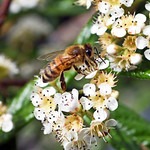|
BCPC's GM/Biotech Crops Report – February 2023 United Kingdom
GM/Biotech Crops Monthly Report February 2023 Good news for bees
America has approved the use of the first vaccine for honey bees to protect them from the bacterial infection Foulbrood which kills the larvae. New food source Blue whales are the largest animals on earth and they feed on plankton because it is more efficient than chasing larger prey. As humans become the largest biomass on earth, perhaps we can learn from them. A new venture is making protein from bacteria using electricity and air. The reduction in land and water requirements make it very efficient and could be a new ‘revolution’ for farming. Wrinkle reduction Following the success of mRNA vaccines fighting Covid, it now seems that it can be used to reduce wrinkles and restore hair loss. It certainly seems to work in mice. More rejuvenation Vaccines are not the only way. Apparently subjecting mice to ultrasound at a frequency of 100 kHz can have a rejuvenating effect. It restarts cell division in aging cells, has an invigorating effect and restored one old hunch-backed mouse to being able to move normally again. Salt-tolerant rice Research at Sheffield University has shown that reducing the number of stomata in the leaves of rice makes it more tolerant of saline soils. This could benefit crops grown in paddy fields at risk of inundation by seawater but it also makes them more difficult to grow in very warm conditions. Cloned rice Hybrid rice can be high yielding and carry good disease resistance but the seed is expensive. Now an international team of researchers has successfully propagated hybrid rice and this is expected to reduce the price of the seed. Herbicide-tolerant maize China has developed a variety of maize that is tolerant of both glyphosate and glufosinate as a way of countering the risk of herbicide resistance developing in the weeds in maize fields. This is not new since maize varieties combining these tolerances and Lepidopteran insect resistance are already marketed. Extending photosynthesis Rhizomatous grasses such as switch grass photosynthesise during the summer months until there is sufficient carbon stored in the rhizomes to see it through winter. It then ceases photosynthesising but researchers at Michigan State University have identified this switch and can keep it turned on so that the grass stores more carbon and makes more sugars during the most productive season. This is an excellent way of improving the grass as an efficient biofuel. EFSA renews approval of GM maize The European Food safety Agency has renewed the approval for import of the GM maize varieties GA21 x T25 (tolerance of glufosinate and glyphosate) and MON87419 (tolerance of glufosinate and dicamba) but there is still no sign of them being approved for production in Europe. SciFi Foods A company in San Francisco has announced that it plans to produce burgers composed of plant components and meat cells grown artificially that have never been even near an animal – all in the name of carbon reduction. Bacterial warfare Some lung infections are hard to treat because the bacteria is resistant to antibiotics but now a team in Spain is developing a nebuliser that will deliver another modified bacteria into the lungs to fight the ‘bad’ bacteria. Gene warfare Silencing genes that are essential to insect survival seems to offer a way of killing target insects without adverse effects on the insects that predate them because they lack the target genes. Researchers at the Boyce Thompson Institute are showing success against aphids and whiteflies with negligible effects on the ladybirds that eat the affected individuals. THE LATEST ADDITIONS TO THE GM/BIOTECH DATABASE ARE: The latest approvals of biotech crops to report this month: • There are no additions to the biotech crops database this month. FOR INSTANT ACCESS TO GM BIOTECH MANUAL CLICK HERE (Registration required) Already Registered? Click here to access
More news from: BCPC (British Crop Production Council) Website: http://www.bcpc.org Published: February 3, 2023 |


